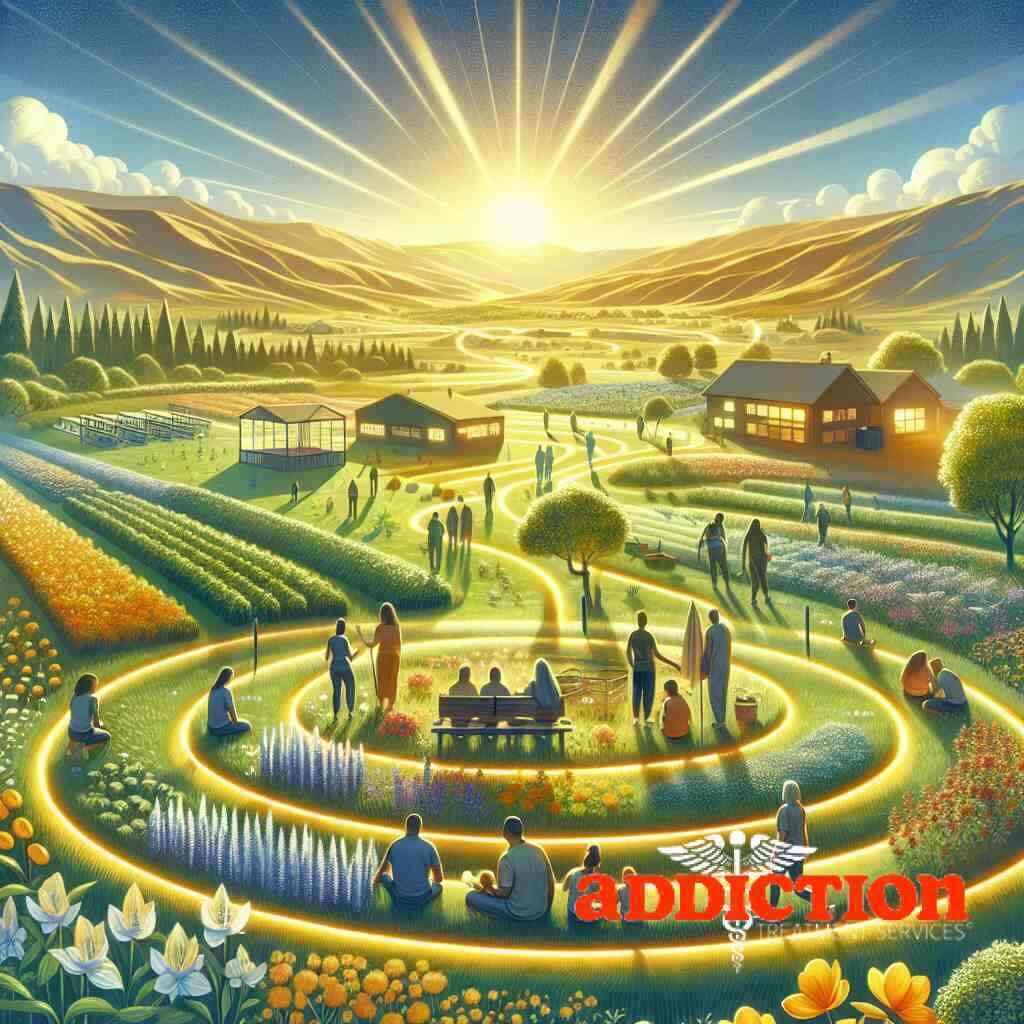 Posted On: 08/27/2025
Posted On: 08/27/2025Pioneering the Future of Detox: Introduction to 2025
Detoxification: The Evolution and Beyond
As we stand at the cusp of 2025, the landscape of detoxification services is more dynamic than ever. The evolution from traditional methods to advanced drug detoxification methods has shaped a new era of recovery. The incorporation of evidence-based practices and innovative approaches is revolutionizing how individuals experience detox. This shift in methodology ensures that clients are better prepared for lengthy recoveries, offering enhanced support through cutting-edge techniques like technology in detox and personalized care plans. With these advancements, the emphasis is increasingly placed on individualized treatment strategies, bridging the gap between initial detox and long-term recovery, marking a significant milestone in addiction treatment.
Unraveling Addiction Treatment Services’ Role in the Future of Detoxification
Addiction Treatment Services is at the forefront of transforming detoxification into a more effective and supportive process. By acting as a lifeline for those grappling with substance use disorders, the platform has streamlined access to a wide array of detoxification services, ensuring individuals find the right fit for their unique needs. As the industry embraces integrative recovery solutions, Addiction Treatment Services stands as a beacon for those seeking comprehensive care, offering a robust directory of treatment options like residential treatment centers and outpatient services. The commitment to evolving the detox experience underscores their pivotal role in shaping the future of addiction recovery.
Setting the Stage: Why 2025 is a Turning Point for Detox Success
The year 2025 is poised to be a turning point in achieving successful detox outcomes. With the integration of advanced detox techniques and the increasing focus on holistic detoxification approaches, there’s a substantial shift in addressing both the physical and mental aspects of recovery. The growing implementation of digital detox tools and virtual support mechanisms enriches the recovery ecosystem, providing continuous care that transcends traditional boundaries. This comprehensive approach ensures the means for tackling complex challenges like co-occurring disorders, heralding a new era where mental health professionals play a critical role in detox success. Addiction Treatment Services continues to spearhead efforts in innovative strategies, setting new standards for effective, sustainable recovery journeys.
Revolutionary Detox Approaches: Integrating Modern Techniques
Innovative Detox Programs: Shaping Outcomes
Innovation continues to shape the future of detoxification services in 2025. Novel innovative detox programs have redefined the landscape, offering new hope for those seeking recovery. These programs integrate cutting-edge methodologies that are tailored to address individual needs, enhancing the efficacy of addiction treatment services. By focusing on unique patient profiles, these initiatives ensure that detoxification processes are more personalized and effective. The commitment to innovation is transforming the journey from detox to recovery, leveraging insights from both clinical research and experiential therapies. As these programs gain momentum, they are setting new standards for success, making addiction treatment services accessible and effective for individuals nationwide.
Technology in Detox: Digital Tools & Virtual Supports
As the digital age advances, technology plays a crucial role in transforming detoxification techniques. Virtual support tools for detox are increasingly utilized, offering 24/7 assistance and bridging gaps in care. These tools provide platforms for virtual counseling, peer support groups, and educational resources, facilitating continuous engagement throughout the recovery process. The incorporation of these digital solutions ensures that individuals have persistent access to care, regardless of location. By integrating technology into detoxification frameworks, the addiction treatment landscape is evolving into a more connected and supportive ecosystem. This approach not only enhances accessibility but also empowers individuals to take an active role in their recovery journey.
Medication-Assisted Detox: Advancements and Applications
The implementation of medication-assisted detoxification represents a pivotal advancement in managing withdrawal symptoms and facilitating smoother transitions to sobriety. By combining pharmacotherapy with therapeutic interventions, this approach targets both the physical and psychological aspects of addiction. The strategic use of medication reduces the discomfort associated with withdrawal, significantly supporting individuals in adhering to detoxification programs. Medication-assisted detox has proven to be an effective strategy in maintaining engagement during the critical early stages of recovery. The nuanced application of this method underscores how modern addiction treatment services are evolving, offering more comprehensive and adaptable solutions to address complex substance use disorders.
Co-occurring Disorder Support: A Holistic Treatment Approach
Addressing co-occurring disorders is essential for a holistic detoxification approach. Recognizing the intricate relationship between mental health and substance use, modern detoxification services prioritize integrated care models. This holistic framework ensures that both substance abuse and mental health conditions are treated concurrently, preventing relapse and promoting sustained recovery. Emphasizing the role of mental health professionals within detoxification frameworks supports the dual focus on mental and physical health needs. Integrating psychotherapy and counseling services fosters a supportive environment where individuals can address underlying psychological issues. By championing this holistic methodology, addiction treatment services are paving the way for more comprehensive, patient-centered care. Learn more about these integrative solutions here.

Personalized Detox Plans: Tailoring Recovery Journeys
The Rise of Personalized Detox Plans in Addiction Treatment Centers
As we delve into 2025, the focus on personalized detox plans is at the forefront of optimizing recovery outcomes. Addiction Treatment Services play a pivotal role in facilitating these customized approaches within addiction treatment centers, ensuring each individual’s journey is uniquely tailored to their needs. This rise in personalization allows for treatments that reflect both the specific substance issues and the personal dynamics of each client. By carefully considering medical history, behavioral patterns, and lifestyle factors, these detox plans empower individuals, enhancing both engagement and success in detoxification services. The integration of personalized strategies positions treatment centers to offer an environment that not only supports immediate detox efforts but also builds a robust foundation for long-term recovery.
Evidence-Based Detox: Aligning Science with Practice
In 2025, the emphasis on evidence-based detox has become a critical element in ensuring the efficacy of addiction recovery processes. By grounding detox strategies in scientific research, addiction treatment services align their interventions with proven methods that are continually refined through ongoing study and clinical trials. This evidence-based approach ensures that clients receive the most effective treatment modalities available, underpinning their detox journey with practices that have been validated for safety and effectiveness. Implementing such scientifically backed protocols not only supports better health outcomes but also fortifies the first step in the recovery process, setting a standard that encourages continuous investment in research and development within the field.
Family Involvement in Detox: Bridging Support Networks
Family plays a crucial role in the detoxification journey, acting as a cornerstone for emotional and practical support. Family involvement in detox is increasingly recognized as a critical component of successful recovery. By actively engaging family members in the treatment process, detox centers foster an environment where open communication and mutual understanding can thrive. Programs are now designed to include family counseling sessions and educational resources that enlighten loved ones about the complexities of addiction and recovery. This involvement not only bolsters the individual’s motivation to succeed but also strengthens the support network essential for long-term sobriety.
Integrative Treatment Approaches: Combining Mental Health in Detox Strategies
Modern detox strategies in 2025 emphasize a holistic approach that integrates mental health considerations into the recovery process. Understanding that substance use disorders often co-exist with mental health challenges, addiction treatment services strive to provide integrative treatment approaches. By incorporating psychological assessments and therapies alongside medical detox, these methods aim to address the full spectrum of an individual’s needs. Mental health professionals are instrumental in this process, facilitating therapeutic interventions such as cognitive-behavioral therapy (CBT) and other psychotherapy techniques. This comprehensive care model not only treats the symptoms of addiction but also works to heal underlying mental health issues, thereby reducing the risk of relapse and promoting enduring recovery outcomes.
Successful Detox Outcomes: Measuring and Ensuring Success
Withdrawal Management 2025: Techniques for Success
In 2025, withdrawal management has evolved to become a cornerstone of successful detox outcomes. By employing advanced detoxification techniques, treatment facilities are now better equipped to handle the complexities of withdrawal symptoms. These advanced methods prioritize patient comfort and minimize the physical distress associated with detox, thereby enhancing patient compliance with detox programs. Innovations such as personalized medication-assisted protocols are tailored to the unique biochemical needs of each patient, offering a smoother transition through the critical first step of recovery. The focus on minimizing withdrawal distress underscores the evolution of detoxification services as they strive to enhance both safety and effectiveness.
Relapse Prevention Strategies 2025: Preparing for Future Challenges
A significant emphasis is placed on developing advanced relapse prevention strategies to ensure long-term success in recovery. Key components include cognitive-behavioral therapy (CBT) and other experiential therapies that address behavioral triggers and reinforce coping mechanisms. By aligning comprehensive treatment solutions with these advanced strategies, addiction treatment centers can proactively manage potential relapse scenarios. The strategic integration of technology, such as mobile applications for real-time support, empowers individuals to maintain their sobriety. This forward-thinking perspective on relapse prevention reflects the broader commitment to sustaining the recovery journey and 2025 successes through innovative, evidence-based practices.
Digital Detox Tools: Pioneering Future Solutions
The advent of digital tools has revolutionized the detox landscape, offering unprecedented support and connectivity. Virtual detox support through mobile apps and online platforms provides individuals with continuous engagement with their recovery network. These tools facilitate instant access to counseling, peer groups, and educational resources, fostering a robust support system that transcends geographical boundaries. By leveraging technology in this manner, addiction treatment centers enhance treatment accessibility and personalize care, enabling individuals to actively engage in their recovery process. The pioneering application of digital detox tools ensures that every journey is supported by a framework of consistent, accessible care.
Comprehensive Treatment Plans: Building an Effective Detox Framework
Central to the success of 2025 detox outcomes is the implementation of comprehensive detox frameworks that cater to the complex needs of individuals undergoing detoxification. These frameworks incorporate a multidisciplinary approach, aligning medical, psychological, and holistic therapies to create a cohesive treatment model. By integrating behavioral health services with traditional detox protocols, treatment facilities offer a well-rounded approach that addresses both substance addiction and underlying mental health challenges. As these plans become more nuanced, the capability to tailor interventions based on individual needs has progressed significantly, ensuring that the treatment process is as effective and supportive as possible.

Beyond Detoxification: Concluding Thoughts for 2025 and Beyond
Addiction Detox Progression: Navigating the Recovery Journey
As we advance into 2025, the progression of addiction detox has become a pivotal aspect of navigating the recovery journey. This evolution reflects the culmination of years of research and practice within addiction treatment services, culminating in more integrated and holistic approaches to recovery. Emphasizing personalized care and comprehensive treatment solutions, modern detoxification now effectively bridges the gap between detox and rehabilitation, thus ensuring continuity of care. With emerging methodologies that address both psychological and physical aspects of addiction, individuals are empowered to navigate their unique paths to recovery with greater confidence and support.
The Lifeline Role of Addiction Treatment Services in Detox Success
At the heart of this evolution, Addiction Treatment Services remains a steadfast lifeline, providing invaluable support and resources to individuals seeking recovery. By offering access to a comprehensive directory of addiction treatment centers, these services simplify the daunting task of finding effective care solutions. Understanding the myriad intricacies of substance use disorders, Addiction Treatment Services ensures individuals are informed about all available options. From residential treatment centers to outpatient recovery models, the commitment to enhancing accessibility highlights the crucial role this platform plays in achieving detox success in 2025 and beyond.
The Road Ahead: Detox Success Factors that Define the Future
Looking towards the future, the landscape of detoxification will continue to evolve, shaped by key success factors that ensure its efficacy. These factors include the integration of advanced technologies, the enhancement of mental health interventions, and the dedication to evidence-based detox strategies. As these components coalesce, they create a more resilient framework for addressing substance abuse. Furthermore, the ongoing refinement of advanced relapse prevention strategies continues to safeguard recovery outcomes, building on momentum that prioritizes long-term wellness. By embracing these future-focused elements, detoxification stands poised to redefine addiction recovery, fostering a more supportive and effective environment for individuals nationwide.
Frequently Asked Questions
Question: How has the evolution of detoxification services influenced the success of addiction recovery in 2025?
Answer: The landscape of detoxification services in 2025 has dramatically evolved, boosting the success of addiction recovery. The integration of advanced detox techniques and personalized detox plans tailors the experience to individual needs, resulting in more effective outcomes. Addiction Treatment Services prioritizes evidence-based detox methods, ensuring that clients benefit from treatments grounded in scientific research. This evolution supports comprehensive treatment plans, enabling a holistic approach to addiction recovery that addresses both physical and mental health aspects. By embracing these advancements, Addiction Treatment Services offers a supportive, cutting-edge environment where individuals can confidently embark on their recovery journey.
Question: In the context of the blog title ‘What are the Critical Elements of Successful Detox in 2025?’, how does family involvement enhance detox outcomes?
Answer: Family involvement plays a crucial role in enhancing detox outcomes by providing essential emotional and practical support. At Addiction Treatment Services, we recognize that involving family members creates a stronger support network, crucial in overcoming substance misuse challenges. Programs now include family counseling sessions to educate loved ones on addiction complexities and recovery processes. This engagement fosters open communication and strengthens motivational dynamics, which are critical components in the detoxification services of 2025. By harnessing family support, we ensure that recovery efforts are bolstered, thereby increasing the likelihood of sustained sobriety and successful detox outcomes. What Is the Role of Family Support at Addiction Treatment Services?
Question: How do digital detox tools and virtual detox support contribute to effective detoxification services in 2025?
Answer: In 2025, digital detox tools and virtual detox support have become pillars of effective detoxification services, transforming the accessibility and reach of addiction treatment. These tools offer continuous engagement with recovery resources, enabling 24/7 access to counseling, peer support groups, and educational materials. At Addiction Treatment Services, we leverage technology to create a more connected and responsive treatment ecosystem. Virtual support ensures individuals can access care from anywhere, promoting sustained engagement in the recovery process. By integrating these digital solutions, we empower individuals to actively manage their detox journey, fostering an environment where recovery is not only achievable but also enduring.
Question: What role do medication-assisted detox and withdrawal management play in advancing detox success in 2025?
Answer: Medication-assisted detox and advanced withdrawal management techniques are pivotal in advancing detox success in 2025. By incorporating these strategies, Addiction Treatment Services effectively minimizes the physical discomfort associated with withdrawal symptoms, ensuring a smoother transition to sobriety. This approach, grounded in evidence-based detox practices, enhances patient compliance and engagement, which are vital for successful detoxification services. The careful application of pharmacotherapy alongside therapeutic interventions addresses both the physical and psychological facets of addiction, providing a comprehensive framework that supports sustained recovery. Thus, medication-assisted detox and advanced withdrawal management underscore our commitment to offering adaptable and effective detox solutions.
Question: How does addressing co-occurring disorders influence the holistic detox approaches provided by Addiction Treatment Services in 2025?
Answer: Addressing co-occurring disorders is instrumental in shaping the holistic detox approaches offered by Addiction Treatment Services in 2025. Recognizing the interplay between mental health challenges and substance use disorders, we prioritize integrative treatment approaches that treat both conditions simultaneously. Our comprehensive treatment plans incorporate mental health professionals who facilitate therapies like cognitive-behavioral therapy alongside medical detoxification services. By providing a dual focus, we mitigate relapse risks and promote enduring recovery outcomes. This holistic treatment strategy ensures that clients receive care that addresses their entire well-being, making it a critical element of successful detoxification services today.


